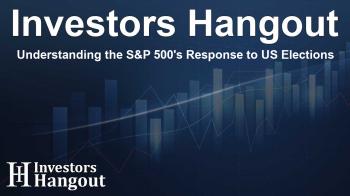Understanding the S&P 500's Response to US Elections

Understanding the Dynamic between US Elections and the S&P 500
As we navigate the intricacies of the stock market, one notion rings true: indices like the S&P 500 tend to appreciate over time, independent of the political landscape.
Since the early 1960s, the S&P 500 has displayed a remarkable trend of positive returns during presidential terms. Notably, Richard Nixon and George W. Bush are the only presidents during this period who experienced exceptions to this trend.
Despite political turnovers, the relentless spirit of tens of millions of American workers and countless international contributors fuels the economy, driving profitability among major corporations. Their daily routines won’t be disrupted by changes in political power, and thus the stock market sees continuity in its upward trend.
Deciphering the Presidential Cycle
Market analysts often highlight a fascinating 4-year Presidential Cycle where market performance typically dips in the initial half of a President's term, only to rebound sharply in the latter two years. This phenomenon can be attributed to incoming leaders focusing initially on fulfilling campaign promises that prioritize social services rather than economic reforms.
As the presidential term progresses, those leaders often recognize the necessity of economic boosts to secure re-election for themselves and their party members, which subsequently enhances market conditions.
Evaluating Congress's Influence
It's crucial to realize that the President's influence isn’t the sole factor. The composition of Congress plays a vital role in stock market performance. It stands to reason that stock performance sees the best annualized returns during periods of a divided Congress, where power is shared between both major parties.
This trend is observable under both Democratic and Republican leadership, reinforcing the idea that collaboration often results in a more favorable market environment. Conversely, when Democrats dominate both chambers, the market has historically shown lower average returns, yet still remains on a generally positive trajectory.
The Bigger Picture: Beyond Elections
Even though understanding these historical patterns is valuable, the broader picture reveals that other elements often hold more sway over market fluctuations. Factors such as immediate policy changes, geopolitical events, and corporate valuations can significantly impact investor behavior and stock performance.
In summary, while US elections undoubtedly have some influence on the stock market, particularly the S&P 500, it is imperative to consider a multitude of contributing aspects. Investors who remain attuned to these dynamics can make well-informed decisions to enhance their portfolios.
Frequently Asked Questions
How do US elections impact the S&P 500?
The stock market, particularly the S&P 500, often continues to rise despite election outcomes, influenced primarily by economic fundamentals rather than political changes.
What is the 4-year Presidential Cycle?
The 4-year Presidential Cycle refers to a historical trend where stock market returns are lower in the first half of a President’s term and stronger in the latter half as economic policies are prioritized.
Does Congress control stock market performance?
Yes, the control of Congress can influence market performance, with divided government historically correlating with better stock market returns.
Are there guarantees of stock market performance?
There are no guarantees in stock market performance, and investors should be wary of basing decisions solely on historical trends.
What factors influence the stock market beyond elections?
Market performance is affected by various factors, including immediate policy impacts, geopolitical events, and overall corporate valuations, which often overshadow electoral outcomes.
About The Author
Contact Ryan Hughes privately here. Or send an email with ATTN: Ryan Hughes as the subject to contact@investorshangout.com.
About Investors Hangout
Investors Hangout is a leading online stock forum for financial discussion and learning, offering a wide range of free tools and resources. It draws in traders of all levels, who exchange market knowledge, investigate trading tactics, and keep an eye on industry developments in real time. Featuring financial articles, stock message boards, quotes, charts, company profiles, and live news updates. Through cooperative learning and a wealth of informational resources, it helps users from novices creating their first portfolios to experts honing their techniques. Join Investors Hangout today: https://investorshangout.com/
The content of this article is based on factual, publicly available information and does not represent legal, financial, or investment advice. Investors Hangout does not offer financial advice, and the author is not a licensed financial advisor. Consult a qualified advisor before making any financial or investment decisions based on this article. This article should not be considered advice to purchase, sell, or hold any securities or other investments. If any of the material provided here is inaccurate, please contact us for corrections.

